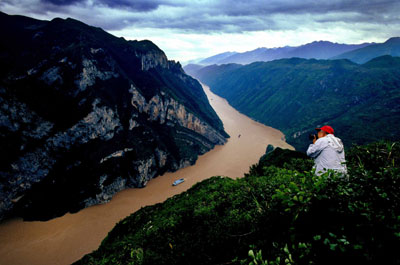Floating down the river of life

Our second-class accommodation is sparse but reasonably clean, with four bunk beds and a large window, the sort fitted in old-style Beijing apartments. No amount of perfume can disguise the smell emanating from the hole that passes as a toilet, despite my mother’s best efforts. There are four decks above water and a couple below, where the accommodations are decidedly spartan and close to the ship's engines.
On time, we slip our moorings, drift into the shipping lane and watch the dazzling nightlights of Chongqing fade into a memory. Meanwhile, our ship's captain creates a kind of son et lumiere experience by shining a searchlight on the far bank and sounding his foghorn.
Early next morning we are between Fengdu and Zhongxian. The scenery has changed from industrial to post-industrial (beached, rusting ships) and farmland. There's no fan or air conditioning and although the cabin window is open as far as it can go the atmosphere is muggy, which drives everyone up for air onto the decks. The mist clears and there's a scent of honeysuckle, which is grown for its medicinal properties.
Families stake out territories by sitting in a circle on the prow and pass around steamed buns for breakfast. Someone commandeers a small plastic chair and scans the bank with binoculars. Most passengers seem content to enjoy the scenery, talk or read.
Though the ferry picks up and deposits passengers en route we do not have time for sight-seeing. This might have been a mistake. There is an abundance of interesting stopover points, we are told, among them the "ghost city" of Fengdu; Wanxian's night market; historic temples in Fengjie; and the Qu Yuan Shrine in Zigui. We stop for a couple of hours in one port and an army of surveyors comes on board with tape measures. We halt again at a floating station for gasoline.
 0 Comments
0 Comments






